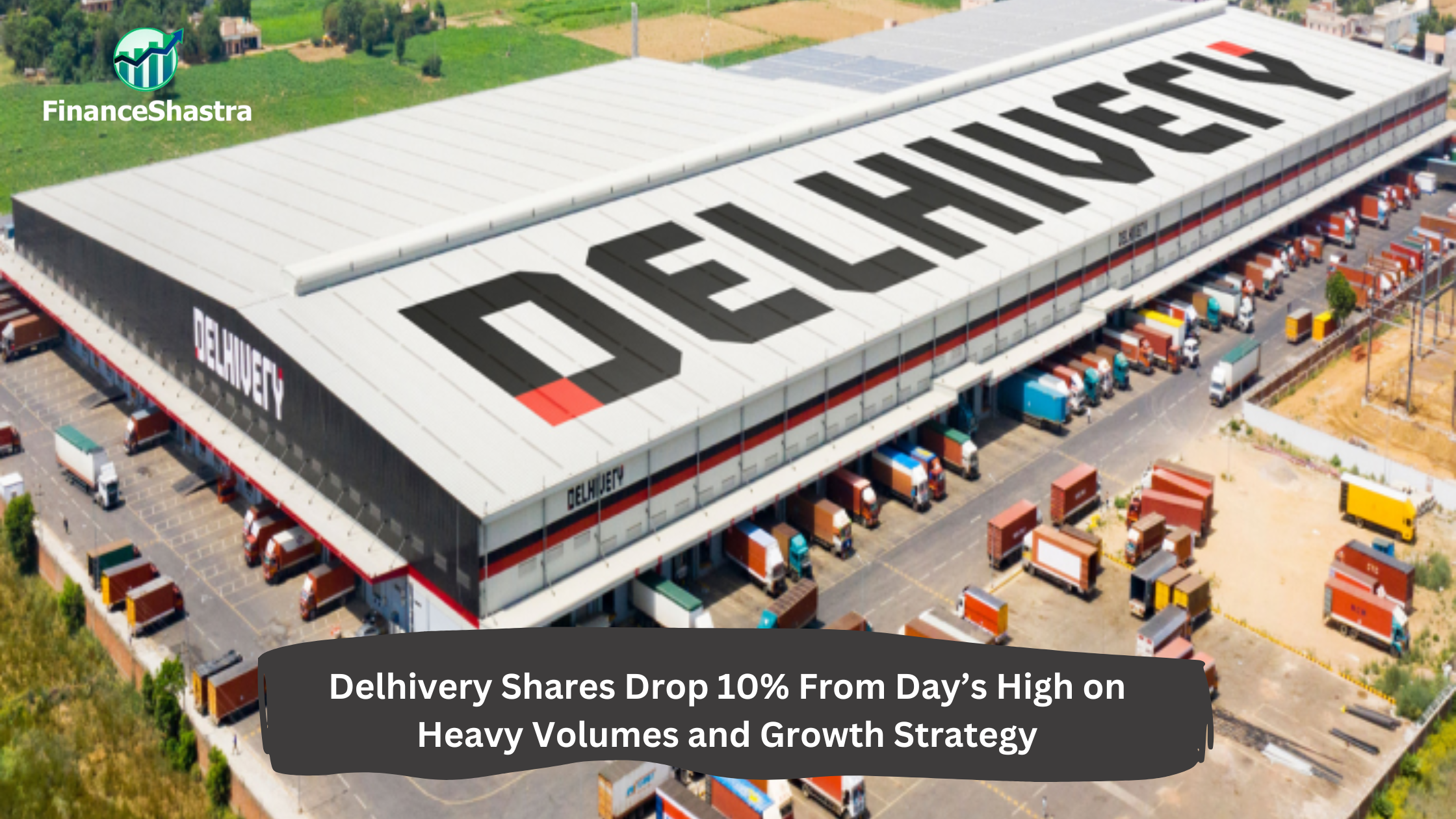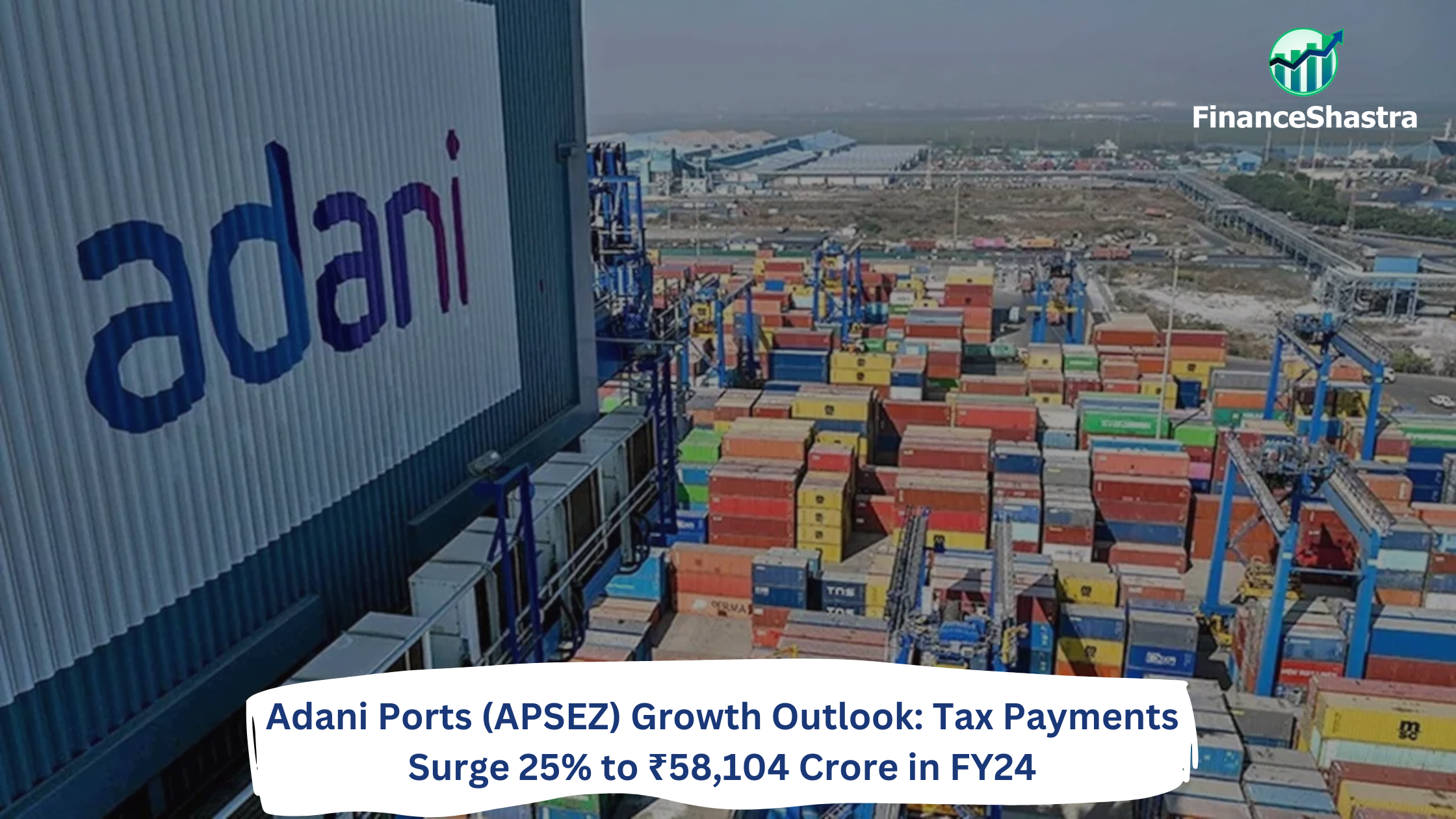Delhivery Shares Drop 10% From Day’s High on Heavy Volumes and Growth Strategy
Business and Industry Overview:
Delhivery is a prominent Indian company that helps send and deliver goods. It started in 2011 in Gurgaon. At first, it delivered food and flowers in a small area. Then the founders saw a big chance in online shopping. So, they changed the business and started helping online stores. Their first client was Urban Touch, a fashion and beauty store. After that, more online companies joined. The company grew fast. In 2019, SoftBank gave $413 million. In 2021, Fidelity gave $277 million. In 2021, Delhivery also bought Spoton Logistics for ₹1,600 crore. It also bought a drone company in the US named Transition Robotics. In 2022, Delhivery sold its shares to the public in an IPO. It raised ₹5,235 crore and got listed on BSE and NSE. Its value became ₹35,283 crore. In 2024, it became a sponsor of Royal Challengers Bangalore in IPL. Delhivery has more than 85 warehouses, 29 sorting centers, and many delivery points. It works in almost all parts of India. It uses technology to deliver faster. It gives many services like parcel delivery, big goods transport, warehousing, returns, cash collection, and international shipping. Sahil Barua is the CEO. Kapil Bharati is the CTO. Other leaders are Sandeep Barasia, Ajith Pai, and Amit Agarwal. Two founders left in 2021. The biggest investors are SoftBank (11.74%), SBI Funds (9.10%), and Nexus Partners (8.96%). Delivery raised $1.4 billion before its IPO. In 2024, it earned ₹7,241 crore but had a loss of ₹1,007 crore. Even with the loss, the company is growing fast and is one of the top delivery companies in India.
Latest Stock News:
Delivery’s share price dropped by over 6% on Tuesday. It had gone down more than 10% from its highest point of ₹275.75 during the day and closed at ₹251.60 on the BSE. This happened even though the overall market improved later in the day. A very large number of shares were traded—about 27.4 million on NSE and BSE combined. This is much more than the usual weekly and monthly average. Experts say the drop happened because many investors sold shares to book profits after the recent price rise. Also, there is some caution in the market because of Delivery’s new deal with Ecom Express.
Delhivery is buying Ecom Express, which is the second biggest company in the business-to-customer (B2C) delivery space. The deal is for ₹1,400 crore and values Ecom Express at 0.6 times its FY24 sales. With this deal, the combined company may control around 55–60% of the B2C express delivery market. This can help Delhivery grow bigger and save costs. But some analysts, like Emkay Global, also warn that there are risks. For example, some e-commerce companies like Meesho are starting to do deliveries on their own, which may reduce the number of orders Delhivery handles in the future. From a technical point of view, Delhivery’s share price is below all its key moving averages (like 5-day, 10-day, 50-day, etc.), which shows weakness in the stock. The RSI is at 54.5, which means the stock is neither too expensive nor too cheap. But the Money Flow Index (MFI) is at 70.3, suggesting that the stock may be slightly overbought and could see a short-term fall.
Still, Emkay has kept a ‘Buy’ rating on the stock, even though it has slightly lowered its target price to ₹400. They believe the deal with Ecom Express will add value to the company in the long run. However, they also say that the success of the deal and growth in delivery volumes will be important to watch.
Potentials:
Delivery wants to grow more in the future. The company plans to become the number one logistics company in India. It wants to use more technology like robots, drones, and smart tracking to make deliveries faster and better. Delivery also wants to do more B2B business, which means helping other businesses send goods. Right now, it works a lot with online shopping, but it wants to do more than that. It also wants to deliver to more small towns and villages, not just big cities. This will help more people use Delhivery. The company wants to save time and money by using smart systems. Delhivery is also buying another company called Ecom Express. It will pay ₹1,407 crore in full cash. After the deal is complete, Ecom Express will become part of Delhivery. The deal will be finished in six months if all rules and approvals are cleared. Ecom Express started in August 2012. It gives full logistics services using technology. Its office is in Gurugram, Haryana. After buying Ecom, Delhivery will become bigger in sending packages to customers (B2C). The company also wants to work with big brands to help them send goods. The main goal is to grow bigger, work smarter, and give better service to all customers.
Analyst Insights:
- Market capitalisation: ₹ 18,319 Cr.
- Current Price: ₹ 246
- 52-Week High/Low: ₹ 478 / 237
- Stock P/E Ratio: 448
- Dividend Yield: 0.00%
- Return on Capital Employed (ROCE): -1.73%
- Return on Equity (ROE): -2.94%
Delivery Ltd. is showing some improvement. In December 2024, the company made a profit of ₹25 crore. This is a good sign because in earlier quarters, it was making losses. Its revenue is also growing. It increased from ₹1,824 crore in December 2022 to ₹2,378 crore in December 2024. This means the company is expanding its business. Delhivery is also buying Ecom Express for ₹1,407 crore in an all-cash deal. After this deal, Ecom will become a part of Delhivery. Ecom Express is a strong company in tech-based logistics. This deal will help Delhivery improve its services and grow more in the B2C (business-to-customer) area. But there are also some problems. The stock is very expensive. Its price-to-earnings (P/E) ratio is 448, which is much higher than other companies. Its return on equity (ROE) and return on capital employed (ROCE) is -1.73%. This shows the company is not using its money well to make profits. In the last 3 years, its average ROE was -11%, which is very low. Also, the stock price has fallen by 44% in the last year. This shows that investors are not very confident in the stock. Still, Delhivery is the biggest and fastest-growing logistics company in India. It works in more than 220 countries and territories. The company has strong services and good future plans. But the financial numbers are still weak.
So, this stock has long-term potential. But it is risky right now. It may be better to wait until the company shows better profits and the stock price becomes reasonable.


